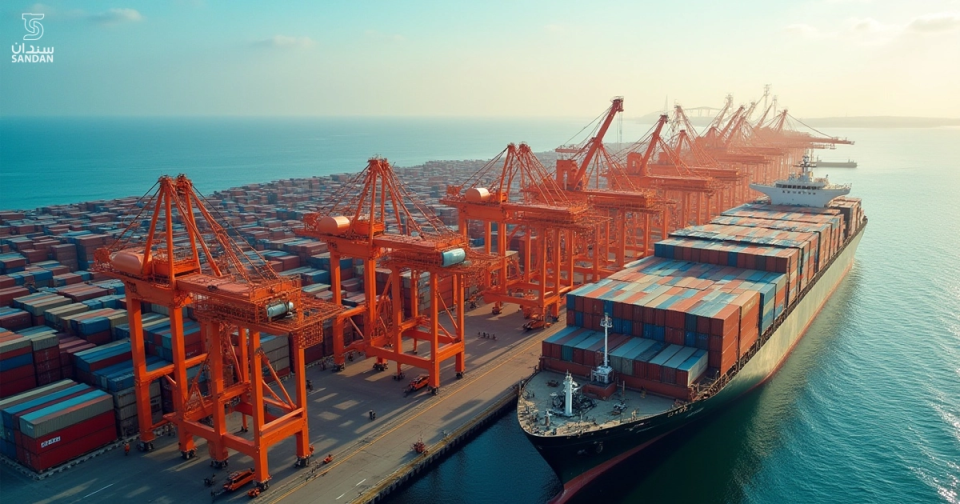In today’s fast-moving global trade landscape, Oman has emerged as a rising logistics hub for the GCC and beyond. Among the key enablers of this growth is the bonded warehouse Muscat port ecosystem, which offers re-exporters a highly efficient, duty-free logistics model.
Whether you’re importing machinery from Asia or finished goods from Europe, bonded warehouses offer a strategic way to store goods without paying customs duties upfront. This allows businesses to maintain cash flow, reduce tax burdens, and better plan for regional distribution, especially for companies engaged in re-export to UAE, Saudi Arabia, and other GCC markets.
Muscat Port, with its proximity to major industrial zones and free trade corridors, offers a well-connected bonded warehousing infrastructure ideal for businesses of all sizes. As Oman positions itself as a re-export bridge between Asia, Africa, and the GCC, understanding how to leverage bonded warehouses at Muscat Port can dramatically improve logistics performance and profitability.
This blog explores what bonded warehousing means, why it matters, and how to choose the right model for your GCC re-export strategy, especially when operating through a bonded warehouse Muscat port setup.
What Is a Bonded Warehouse and How Does It Work?
A bonded warehouse is a secured facility where imported goods can be stored without paying customs duties until they are either sold domestically or re-exported. These warehouses operate under the supervision of customs authorities, making them a critical part of international logistics and supply chain management.
In the case of a bonded warehouse at Muscat port, businesses can import goods and hold them in storage within the port’s bonded zone without the immediate burden of customs clearance or tax payment. Duties are only applied when the goods leave the warehouse for local distribution. If the goods are re-exported, no duties are charged at all.
Bonded vs. Non-Bonded Storage
The key distinction lies in customs obligations. In non-bonded warehouses, import duties must be paid before the goods are stored or distributed. In bonded warehouses, however, the duty is deferred, providing businesses with financial flexibility and easier inventory control.
This is especially beneficial for re-export businesses, who can avoid double taxation and lengthy customs clearance processes by using bonded storage. Goods can also be processed, repackaged, or labeled while still in the bonded zone, further improving time-to-market.
Facilitating Duty-Free Imports and GCC Re-Exports
For businesses targeting the GCC, a bonded warehouse at Muscat port setup allows them to bring in bulk shipments and distribute them as per regional demand without incurring upfront duties. This model reduces working capital requirements and speeds up supply chain responsiveness.
Muscat Port’s bonded warehouses are optimized for such operations with customs-cleared facilities, automation, and seamless integration with road and sea logistics. As Oman accelerates its Vision 2040 goals to become a regional trade and logistics hub, these warehouses play a foundational role in enabling competitive re-export strategies.
Why Muscat Port Is Strategically Ideal
A Gateway to GCC, Africa, and the Indian Subcontinent
Muscat Port holds a geographically advantageous position at the crossroads of Asia, Africa, and the Middle East. Its proximity to the Strait of Hormuz allows for swift maritime access to neighboring GCC countries like the UAE, Saudi Arabia, and Qatar. Additionally, it shortens trade routes to East Africa and the Indian subcontinent, making it a natural hub for re-export logistics.
For businesses looking to establish a bonded warehouse at Muscat port, this centrality ensures faster transit times, better inventory control, and a broader export reach.
Massive Government Investments in Port Infrastructure
As part of Oman Vision 2040, the government has invested heavily in expanding port capabilities, particularly at Muscat and Sohar. Muscat Port has seen modern upgrades in customs automation, dockside warehousing, and multimodal logistics infrastructure. These upgrades have helped the bonded warehouse Muscat port environment evolve into a streamlined, business-friendly platform for global trade.
From cold storage to heavy machinery staging areas, facilities are now purpose-built to support import-export activity with minimum delay and maximum efficiency.
Customs Efficiency that Boosts Business Confidence
One of the key differentiators of the bonded warehouse Muscat port setup is its customs efficiency. Oman Customs has implemented electronic systems that reduce paperwork, lower clearance times, and enable real-time tracking of bonded goods. These systems minimize bottlenecks and support just-in-time delivery models for businesses involved in GCC-wide trade.
Whether you’re importing components from China or electronics from Germany, bonded clearance at Muscat Port gives your supply chain the edge it needs.
Integrated Multimodal Connectivity
Muscat Port is directly linked to Oman’s national highway system and is within close proximity to Muscat International Airport. This integration allows goods stored in a bonded warehouse at Muscat port to be quickly transported by road or air for local use or re-export.
The combination of port, airport, and road network ensures goods can flow seamlessly through Oman and out to the GCC or international markets. It also supports hybrid logistics models like cross-docking and break-bulk re-export strategies.
Types of Bonded Warehousing Models
When setting up a bonded warehouse Muscat port strategy, businesses must choose a model that matches their trade volume, product type, and operational needs. Here are the four main models available:
Public Bonded Warehouses
Public bonded warehouses are run by third-party providers and are available for multiple businesses to use. These facilities are ideal for SMEs or traders that do not require large, dedicated spaces. Users can rent space based on pallet, square meter, or container.
Pros:
- Low entry cost
- Flexible lease terms
- Shared operational expenses
Cons:
- Limited control over warehouse processes
- May face scheduling issues during peak times
This model suits small traders, seasonal importers, and businesses testing the GCC market.
Private Bonded Warehouses
Private bonded warehouses are owned or leased by a single company and managed for its exclusive use. This option offers full control over storage, inventory, security, and operations.
Pros:
- Complete control
- Custom design and automation integration
- Ideal for high-volume re-exporters
Cons:
- Higher upfront costs
- Requires operational management
A bonded warehouse at Muscat port, operated privately, is ideal for manufacturers, large distributors, or companies dealing in regulated or high-value goods.
Free Zone Warehouses with Bonded Status
Free zones in Oman, like Salalah or Sohar, offer bonded warehouse facilities with added benefits such as tax holidays, 100% foreign ownership, and streamlined licensing.
Pros:
- Full customs and tax benefits
- Simplified company formation
- Suit international businesses
Cons:
- May be located farther from the Muscat central market
- May involve higher lease rates for premium zones
Some companies still maintain a bonded warehouse Muscat port for immediate throughput while using a free zone facility for regional staging.
Third-Party Logistics (3PL) Bonded Services
In this model, businesses outsource their bonded warehousing to a logistics company that handles everything—from import clearance to storage, repackaging, and delivery.
Pros:
- No infrastructure investment
- Access to logistics expertise
- Pay-as-you-use pricing
Cons:
- Limited customization
- Data visibility depends on the 3PL system
This is best for e-commerce exporters, dropshippers, and companies looking for fast scalability without owning infrastructure.

Key Factors in Choosing the Right Bonded Warehouse Model
Selecting the ideal bonded warehouse model at Muscat Port is a critical decision that directly impacts your operational efficiency and cost-effectiveness. Not all bonded warehouse setups are suitable for every business, and the best model depends on several strategic considerations.
Type of Goods Stored
The nature of your inventory plays a central role in determining the ideal warehouse model. Perishables like food or pharmaceuticals require cold storage and regulatory compliance, best handled in specialized or private bonded facilities. Electronics may demand high-security storage and controlled humidity, while heavy machinery calls for reinforced flooring and large loading docks.
Choosing a bonded warehouse at Muscat port that aligns with your product’s physical and regulatory requirements is the first step in optimizing your supply chain.
Storage Duration and Shipping Frequency
Businesses that turn over inventory quickly may prefer public or 3PL-bonded facilities, where goods are stored temporarily before re-export. Companies with less frequent shipments or those needing staging areas for seasonal inventory might lean toward private bonded warehouses.
Muscat Port offers both short-term and long-term storage options through its bonded warehousing ecosystem, allowing businesses to match storage terms with operational rhythms.
Destination Markets and Delivery Timelines
Your re-export destinations will also influence the best-fit model. For example, if your goods are primarily re-exported to the UAE or KSA with tight delivery timelines, proximity and rapid customs processing at a bonded warehouse in Muscat port become crucial.
For businesses serving multiple GCC countries, integration with road and sea transport systems is vital to ensure timely cross-border delivery.
Third-Party vs. Self-Managed Logistics
Some companies prefer to manage their warehousing and distribution internally, which makes private bonded facilities or dedicated free zone spaces ideal. Others may benefit from outsourcing to 3PL providers that offer end-to-end logistics management, including customs handling and inventory control.
Evaluating your internal capabilities and long-term growth vision will help determine whether your bonded warehouse operations at Muscat Port should be self-managed or outsourced.
Regulatory and Compliance Requirements
Operating within a bonded warehouse, Muscat port comes with strict regulatory frameworks designed to protect both customs revenue and supply chain integrity. Understanding these requirements is essential to avoid delays, penalties, or compliance issues.
Customs Clearance Protocols
Bonded warehouses at Muscat Port operate under the supervision of Oman Customs. All imported goods must be declared, logged into a bonded inventory management system, and held under seal until cleared for re-export or local release. The advantage here is that duties are deferred until goods exit the warehouse.
The e-customs portal (Bayan System) allows importers to pre-declare goods, track their status, and manage bonded inventory digitally, reducing paperwork and clearance time.
Documentation Essentials
To store goods in a bonded facility, businesses must submit a set of documents including:
- Commercial invoice
- Packing list
- Bill of lading or airway bill
- Import permit or certificate of origin (if applicable)
- Warehouse bond approval or lease agreement
These documents must be submitted to Oman Customs before or upon arrival of goods at the port.
Inspection and Tracking Requirements
Goods entering a bonded warehouse at Muscat port are subject to inspection by customs officers. This includes physical inspection, verification of declared values, and security screening.
Warehouses must have systems in place for real-time tracking and segregation of bonded vs. non-bonded goods. Surveillance, tamper-proof seals, and electronic logs are part of the compliance protocol.
Oversight by Oman Customs and MoCIIP
Oman Customs is responsible for enforcing bonded warehouse regulations, while the Ministry of Commerce, Industry and Investment Promotion (MoCIIP) ensures the business entity is properly licensed to operate in Oman.
MoCIIP also helps through industrial parks like Sandan and free zones, helping businesses obtain bonded status and set up warehouses efficiently. Their role becomes especially important for foreign investors navigating regulatory procedures for the first time.
Understanding these regulatory dimensions is essential to operating a compliant, efficient, and growth-ready bonded warehouse Muscat port strategy.
Cost Implications and Tax Advantages
Storage Fees and Deferred Customs Duties
One of the biggest financial advantages of using a bonded warehouse at Muscat port is the ability to defer customs duties until the goods are either sold locally or re-exported. This reduces the upfront capital requirements for importers, helping them maintain better cash flow. Storage fees in bonded warehouses are generally based on the volume and duration of storage, but they often remain competitive due to government support and the scale of operations at Muscat Port.
For businesses that import in bulk and distribute regionally, bonded warehouses significantly reduce holding costs compared to traditional warehousing that requires duty payment at the point of entry.
Tax Savings for Re-Exporters
Goods stored in bonded warehouses that are eventually re-exported do not incur import duties or VAT in Oman. This exemption can lead to significant tax savings, especially for businesses operating in electronics, textiles, and FMCG sectors. Additionally, Oman does not impose personal income taxes or capital gains taxes, making it a strategically advantageous location for regional operations.
Using a bonded warehouse at Muscat port also helps businesses avoid double taxation when moving goods through multiple GCC countries.
Financial Advantages Over Traditional Warehousing
Traditional warehousing requires immediate customs clearance, duty payment, and VAT processing, all of which increase operational costs upfront. In contrast, bonded storage gives businesses time to manage their sales cycles and make payments only when goods are released into the market. This flexibility is particularly useful for seasonal goods, consignment-based sales, or fluctuating regional demand.
For SMEs and global distributors alike, the bonded model provides more financial breathing room without compromising supply chain speed.
Hypothetical Example: Cost Breakdown
Imagine an electronics importer bringing in $100,000 worth of inventory. At a typical 5% duty rate, traditional warehousing would require an upfront $5,000 payment. However, by storing the goods in a bonded warehouse at Muscat port and re-exporting 80% of them, the business only pays duties on the remaining 20%, saving $4,000 immediately. Combined with lower storage fees and quicker clearance, the total savings could exceed 10–12% per shipment.
How Bonded Warehouses Support GCC Re-Export Strategy?
Value-Added Services Within Bonded Areas
A bonded warehouse at Muscat port doesn’t just store goods—it also enables value-added services like repackaging, relabeling, and product customization. These activities can be conducted within the bonded zone without triggering duty payments, allowing businesses to prepare products according to regional preferences or regulatory requirements before re-export.
This setup is especially beneficial for apparel, electronics, and branded consumer goods that require localization before reaching end users in various GCC markets.
Faster Re-Export Timelines
By centralizing inventory at Muscat Port in a bonded facility, companies can significantly reduce the time it takes to re-export goods to neighboring countries. Goods that are already cleared for bonded storage can be dispatched within hours of receiving a new order, enabling faster delivery to customers or distribution hubs in the UAE, KSA, Bahrain, or Qatar.
Compared to clearing goods through multiple country-specific customs processes, a bonded warehouse allows for batch processing and more agile logistics management.
Strengthening E-Commerce and Wholesale Logistics
As cross-border e-commerce continues to grow in the GCC, bonded warehouses have become essential infrastructure for fulfillment. Products can be staged at a bonded warehouse in Muscat port, sold via online channels, and then shipped directly to customers in the region without delay.
This model supports both B2B wholesale operations and B2C e-commerce, offering a hybrid supply chain solution that combines storage, customization, and delivery under one umbrella.
Sandan’s Connectivity to Bonded Warehouse Muscat Port
#1 Strategic Proximity to Muscat Port
Sandan Industrial Park is strategically located just outside central Muscat, providing seamless access to the bonded warehouse Muscat port area via a well-established logistics corridor. This location offers a logistical advantage for businesses that depend on regular import-export operations through Oman’s primary seaport.
With wide highways and minimal congestion, cargo movement between Sandan and Muscat Port remains fast and cost-effective, making it ideal for businesses managing time-sensitive inventory.
#2 Balancing Port Access with Urban Affordability
While setting up directly at the port might come with higher land and facility costs, Sandan offers a more affordable alternative without compromising connectivity. Businesses can operate from Sandan’s light industrial and logistics zones and still enjoy near-immediate access to the bonded warehouse at Muscat port, helping them reduce OPEX while maintaining operational speed.
This affordability factor makes Sandan especially attractive for SMEs, re-exporters, and logistics providers looking to optimize both real estate and shipping costs.
#3 Flexible Leasing Options for Industrial Tenants
Sandan provides leasing solutions tailored for warehousing, assembly, and distribution. Companies can set up warehouses, showrooms, or small-scale manufacturing units, all while remaining within close distance to Oman’s customs-cleared bonded facilities. Tenants benefit from streamlined permits, access to utilities, and a growing ecosystem of suppliers and service providers.
For companies that rely on the bonded warehouse at Muscat port for regional re-export, Sandan offers a high-value base to grow and operate efficiently.
Tips for Businesses New to Bonded Warehousing
Tip 1. Engage Experienced Freight Forwarders
When navigating bonded warehousing in Oman for the first time, working with freight forwarders who are experienced in customs clearance is critical. These professionals ensure your goods are accurately documented and quickly processed through the bonded warehouse Muscat port system.
Tip 2. Choose Warehousing Partners with GCC Re-Export Experience
Not all warehouse providers are equipped for high-frequency re-export operations. Make sure to partner with bonded warehouse operators who understand the demands of regional shipping, customs, and compliance, particularly those offering integration with the UAE, KSA, and Bahrain routes.
Tip 3. Leverage Digital Tracking and Inventory Systems
Bonded warehousing in Oman requires a high degree of inventory control. Implement digital systems that allow for real-time stock visibility, customs audit trails, and shipment tracking. This ensures compliance and improves your ability to scale.
# Plan for Re-Export Documentation in Advance
Each re-export shipment will require accurate documentation, including customs declarations, commercial invoices, and transport records. Build this process into your supply chain from day one to avoid costly delays at the bonded warehouse, Muscat port, or destination borders.
Frequently Asked Questions
What is a bonded warehouse at Muscat Port?
A bonded warehouse at Muscat Port is a secure storage facility where imported goods can be held without paying customs duties until they are released for domestic sale or re-exported.
Who can use the bonded warehouse Muscat port facility?
Importers, exporters, third-party logistics companies, and re-export businesses can all use bonded warehouse facilities, provided they meet customs clearance requirements.
Are there time limits for storing goods in a bonded warehouse?
Yes, goods can typically be stored in a bonded warehouse for up to 2 years, although extensions may be granted depending on the nature of the goods and intended use.
Can I do repackaging or labeling inside a bonded warehouse?
Yes. Most bonded warehouses, including those near Muscat Port, allow for basic value-added services such as repackaging, labeling, and assembly within compliance limits.
How do I get started with a bonded warehouse Muscat port setup?
Begin by working with a licensed customs broker or freight forwarder, and apply for bonded storage permissions through Oman Customs or your logistics partner.

Conclusion
For businesses aiming to expand in the GCC region, choosing a bonded warehouse Muscat port unlocks strategic advantages—from deferred duties and streamlined re-exports to faster delivery and flexible logistics operations. With Oman emerging as a major logistics and industrial hub under Vision 2040, bonded warehousing is no longer a luxury—it’s a competitive necessity.
Muscat Port’s proximity to Africa, India, and other GCC countries, combined with government-driven customs efficiency, makes it the ideal launchpad for regional trade. Whether you’re a large importer, a growing SME, or a third-party logistics provider, setting up with the right bonded model can lower costs and increase agility.
And if you’re looking for the perfect base to support your operations, Sandan Industrial Park offers unbeatable access to the bonded warehouse at Muscat port along with flexible leasing, industrial infrastructure, and growth-ready support.
Ready to simplify your regional logistics and grow faster? Explore Sandan’s solutions today.












